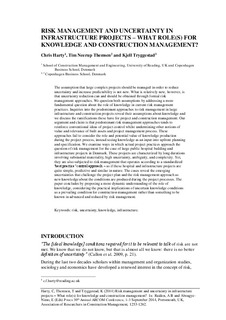Risk management and uncertainty in infrastructure projects – what role(s) for knowledge and construction management?
Conference object
Permanent lenke
http://hdl.handle.net/11250/283736Utgivelsesdato
2014Metadata
Vis full innførselSamlinger
Originalversjon
Harty, C, Themsen, T and Tryggestad, K (2014) Risk management and uncertainty in infrastructure projects – What role(s) for knowledge and construction management? In: Raiden, A B and Aboagye-Nimo, E (Eds) Procs 30th Annual ARCOM Conference, 1-3 September 2014, Portsmouth, UK,Association of Researchers in Construction Management, 1253-1262.Sammendrag
The assumption that large complex projects should be managed in order to reduce uncertainty and increase predictability is not new. What is relatively new, however, is that uncertainty reduction can and should be obtained through formal risk management approaches. We question both assumptions by addressing a more fundamental question about the role of knowledge in current risk management practices. Inquiries into the predominant approaches to risk management in large infrastructure and construction projects reveal their assumptions about knowledge and we discuss the ramifications these have for project and construction management. Our argument and claim is that predominant risk management approaches tends to reinforce conventional ideas of project control whilst undermining other notions of value and relevance of built assets and project management process. These approaches fail to consider the role and potential value of knowledge production during the project process, instead seeing knowledge as an input into upfront planning and specification. We examine ways in which actual project practices approach the question of risk management for the case of large public hospital building and infrastructure projects in Denmark. These projects are characterized by long durations involving substantial materiality, high uncertainty, ambiguity, and complexity. Yet, they are also subjected to risk management that operates according to a standardized ‘best practice’ control approach – as if these hospital and infrastructure projects are quite simple, predictive and similar in nature. The cases reveal the emerging uncertainties that challenge the project plan and the risk management approach as new knowledge about the conditions are produced during the project processes. The paper concludes by proposing a more dynamic understanding of the role of knowledge, considering the practical implications of uncertain knowledge conditions as a prevailing condition for construction management rather than something to be known in advanced and reduced by risk management.

